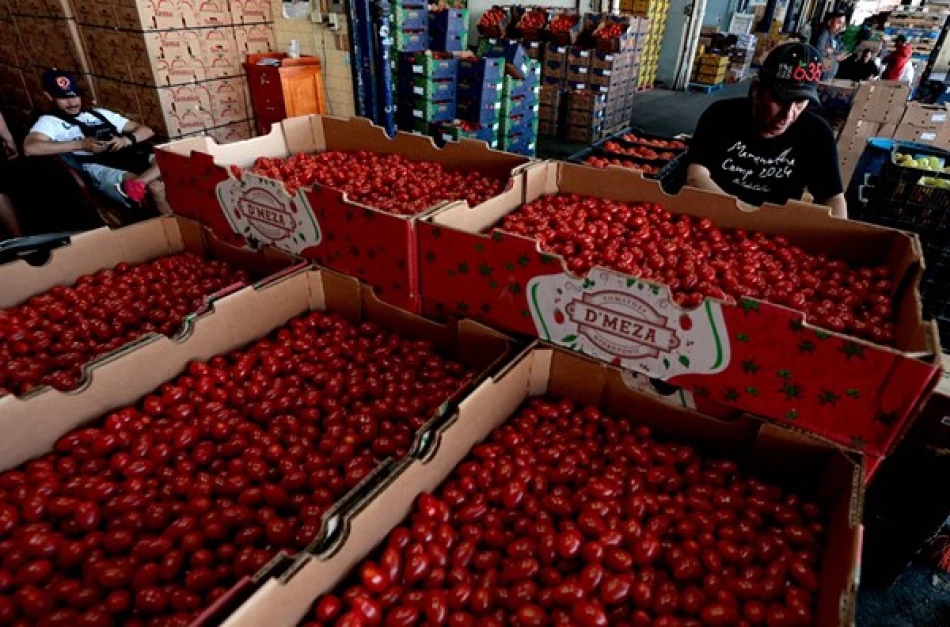
US Imposes 17% Tariffs on Mexican Imports, Escalating Trade Tensions
Trump Administration Slaps 17% Tariffs on Mexican Tomatoes, Ending Decades-Old Trade Agreement
The Trump administration has imposed a 17% tariff on fresh tomato imports from Mexico and terminated a longstanding trade agreement between the two countries, targeting a $3 billion annual trade flow that supplies two-thirds of America's tomato consumption. The move signals an escalation in trade tensions and could substantially increase grocery costs for American consumers while disrupting established agricultural supply chains.
End of a 28-Year Agricultural Partnership
The U.S. Department of Commerce announced its withdrawal from a 2019 agreement with Mexico that had suspended anti-dumping investigations into Mexican tomato exports. This decision effectively ends a trade relationship that began in 1996, when both countries first signed an agreement to regulate Mexican tomato exports and address American complaints about unfair competition.
The original framework was designed to prevent trade disputes while allowing Mexican producers to access the lucrative U.S. market. The agreement had been renewed multiple times over nearly three decades, most recently six years ago, specifically to avoid anti-dumping investigations that have now been triggered.
The Economics Behind the Tariff Rate
The 17.09% anti-dumping duty was calculated based on what U.S. trade officials determined to be the margin by which Mexican tomato prices were "unfairly" reduced for export to American markets. This rate reflects the administration's assessment of how much Mexican producers were allegedly undercutting fair market prices.
Commerce Secretary Howard Lutnick justified the action, stating that American farmers "have been crushed for far too long by unfair trade practices that undercut prices for crops like tomatoes." The administration framed the tariffs as a protective measure for domestic agricultural producers who claim they cannot compete with lower-priced Mexican imports.
Mexico's Response and Broader Trade Implications
Mexican officials strongly condemned the decision, with the country's Economy and Agriculture ministries issuing a joint statement calling the U.S. action "unfair" and contrary to the interests of both Mexican producers and the American industry. Mexico revealed that its tomato growers had submitted positive proposals to the United States, which were rejected for what officials described as "political reasons."
This tomato dispute occurs against the backdrop of broader trade tensions. Trump had separately threatened to impose 30% tariffs on all Mexican imports starting August 1st, following weeks of unsuccessful negotiations for a comprehensive trade agreement. The timing suggests the tomato tariffs may be part of a broader strategy to pressure Mexico on multiple economic fronts.
Market Impact and Consumer Consequences
The tariffs will likely result in higher tomato prices for American consumers, particularly during winter months when Mexican imports traditionally fill gaps in domestic production. With Mexico supplying two-thirds of U.S. tomato consumption, the price impact could be significant across grocery stores and restaurants nationwide.
For investors and agricultural markets, this move creates uncertainty about the stability of North American food supply chains. Companies involved in tomato processing, distribution, and retail may need to reassess their sourcing strategies and pricing models.
Historical Context and Future Outlook
This action represents a significant departure from decades of agricultural cooperation between the two countries. The original 1996 agreement was seen as a model for managing trade disputes while maintaining market access. Its termination suggests a more confrontational approach to trade relationships, even with close neighbors and established partners.
The tomato tariffs also reflect broader shifts in U.S. trade policy, where traditional multilateral agreements are being replaced by more aggressive unilateral measures. This approach prioritizes immediate protection for domestic producers over long-term trade relationships and consumer costs.
Most Viewed News

 Layla Al Mansoori
Layla Al Mansoori






